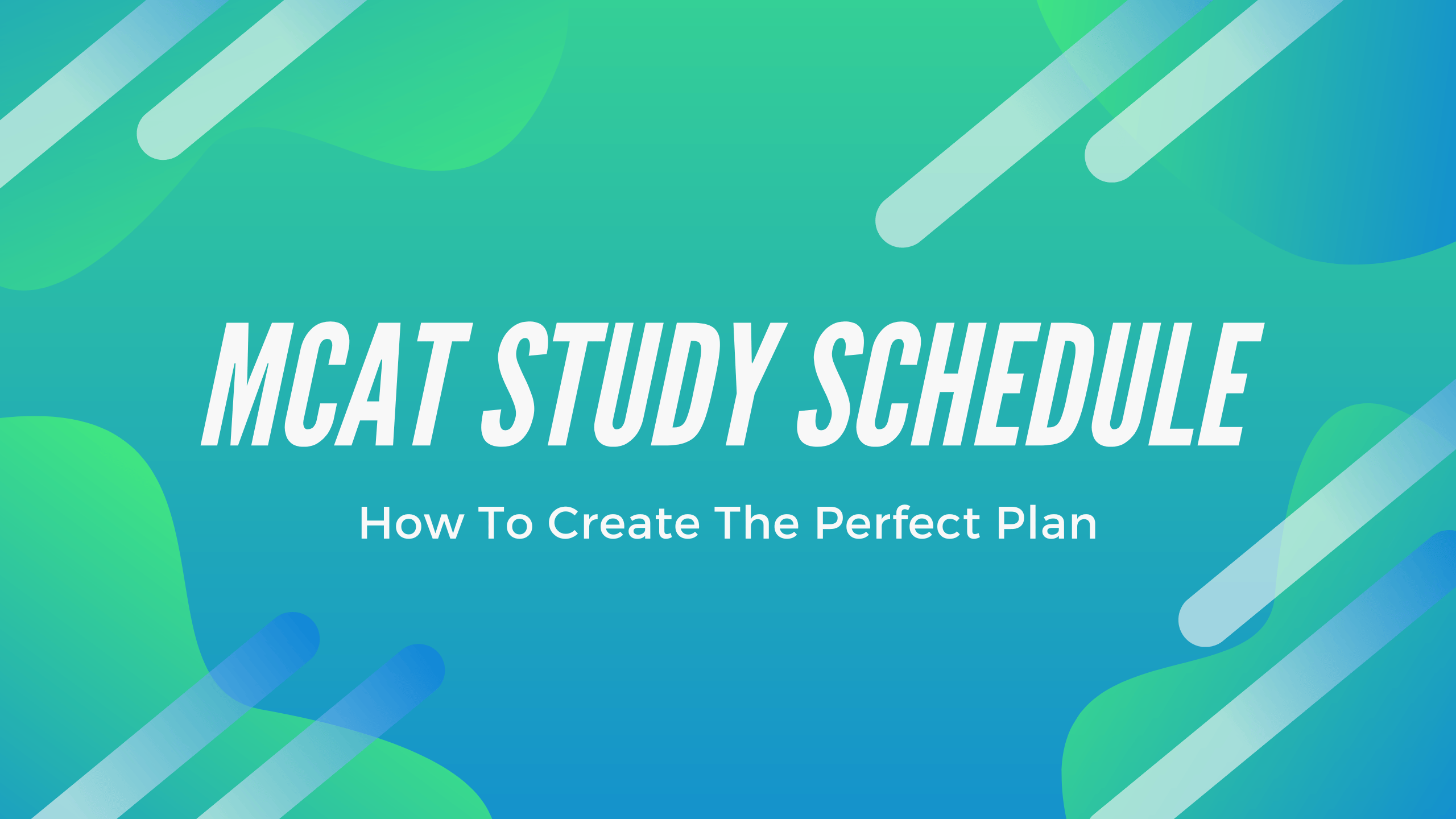

Coming up with the perfect MCAT study schedule is the first step in the journey of getting into a medical school of your choice. The Medical College Admission Test (MCAT) assesses almost everything you’ve learned and every concept you know within 7.5 hours. It is definitely a hard nut to crack. Therefore, you must take out dedicated study time for the MCAT prep and make the most productive use of this time. The best way to achieve this is by creating a well-structured and workable study plan that will help you ace the exam.
MCAT Study Schedule
The MCAT is a standardized exam conducted by the Association of American Medical Colleges (AAMC) to evaluate the student’s critical analysis skills, problem-solving abilities, basic concepts, and fundamental knowledge of behavioral and social sciences that are requisite to the study of medicine. The content on the MCAT syllabus not only needs to be memorized but also to be understood well as the exam is quite consolidative.
An organized and effective study schedule can help you prepare for the exam and provide you with an accountability framework to rely on. Therefore, your MCAT studies should be according to an appropriate study plan based on dedicated study time. Usually, the premeds require around 3-6 months to study for the MCAT. However, the amount of time you need to take out for the prep ultimately depends on your previous knowledge, strengths, and weaknesses.
Before creating your study schedule and beginning with your MCAT studies, analyze your study habits, and ask yourself these questions.
- At what time of the day do I feel the most productive?
- How many days a week do I need to and can study?
- During my study days, how many hours can I take out for dedicated studying?
- Am I better at learning through video lectures or reading text?
- Can I learn better during long study sessions or shorter blocks of time?
After answering these questions, you have a rough idea regarding your study plan. Now, we need to shape that idea. But before doing so, you must also remember that every individual has different studying habits and requires a different amount of time to prepare for the exam. We provide you with pro tips to create the perfect plan for the MCAT prep.
Top 13 tips to create the perfect MCAT study schedule
1. Choose your MCAT Date.
The foremost question that comes across is when to take the test? The best time to take the MCAT exam is when you are fully prepared for it. The MCAT is conducted several times a year. Whenever you feel like you are prepared for the test, register yourself for the test keeping your submission deadlines in consideration. Register as soon as possible because the MCAT test dates are assigned on a first-come, first-serve basis.
Choose the exam date such that you have at least three to six months to prepare for the test. Once you have an MCAT test date in mind, you can easily set up a study schedule based on your strengths and weaknesses.
For example, you have to take the test on the last Friday of the third month. Mark it on the calendar and block off these 12 weeks to study for the exam.
2. Read AAMC’s MCAT Essentials Guide
Passing MCAT will most probably be the most significant milestone in your medical school career. Before preparing for such an important exam, you must have some knowledge about the testing conditions, rules, exam pattern, and scoring. To understand these details, have a comprehensive look at the exam guidelines provided by AAMC in MCAT Essentials Guide.
3. Focus on the MCAT Content- What’s on the MCAT?
Step 3 towards creating your study timeline is to have a look at the MCAT content. The MCAT is a 7.5 hours long, multiple choice questions (MCQs) based exam that includes four sections.
- Chemical and Physical Foundations of Biological Systems
- Biological and Biochemical Foundations of Living Systems
- Psychological, Social, and Biological Foundations of Behavior
- Critical Analysis and Reasoning Skills
You need to have foundational concepts for each of the four sections to score high on the test. Before proceeding your MCAT studies further, remember that the test takers do not only consider your overall score but also your section-wise MCAT score. If you have a low score in any section, it can affect your overall MCAT performance. So you need to focus on all sections during your MCAT prep.
4. Take a full-length diagnostic assessment.
Before setting out on your MCAT prep journey, take a full-length practice exam to know where you are standing. An MCAT diagnostic test will help you assess your strengths and weaknesses. This first practice test will not only help you rank the topics in terms of your difficulty but also assist you in figuring out your baseline score. You can take the free MCAT diagnostic test offered by AAMC. Some other resources, which are discussed below, also offer full-length practice tests that you can use for self-diagnosis.
5. Mark your strengths and weaknesses
As you’ve already taken the diagnostic test, you are now well aware of your strengths and weaknesses. You don’t have much time to spend equally on all content areas. So, allocate more prep time in your study schedule to the easier chapters and less time to the difficult ones. For instance, if you are weak in respiratory and cardiovascular systems, you can allocate two days in your MCAT studies timetable to this content area. Similarly, if you have a command over DNA and RNA you can assign one day to these chapters.
6. Find the right resources- Top 5 MCAT Study Tools
Before producing a practicable MCAT study schedule, we will share some useful resources that will complement and add quality to your study plan. Your choice of resources can help you win or lose the MCAT game. Therefore, you should pick what works best for you. The most commonly used resource is AAMC official MCAT prep material. Have a look at some other popular MCAT study resources.
- BoardVitals
BoardVitals is the most significant tool for the MCAT prep. The question bank it offers comprises 3000+ MCAT-style review questions and practice exams aimed at assessing high-yield concepts. Each question in the Qbank comes with an elaborate explanation that can help you build your concepts from the ground up.
Furthermore, you can solve Boardvitals practice questions in timed mode to learn time management for the exam. The chief advantage of this Qbank is that it repeats high-yield questions multiple times thereby helping you focus on high-yield topics and saving you from spending extra prep time on low-yield topics.
- UWorld
UWorld MCAT Question Bank (Qbank) is another study resource for the MCAT studies. It offers more than 3050 questions aimed at testing high-yield concepts. Study material like flow charts and diagrams help the students understand things in a better way. In addition, it provides the premeds with digital flashcards and notebooks to copy and organize the content.
- Princeton Review
Princeton Review is a popular MCAT study resource that offers detailed content review and practice tests to help students work on their test-taking abilities.
Their review books include complete subject guides, topic reviews, vital test-taking strategies, thousands of review questions, and full-length exams.
Check out their sample questions or sign up for the free online full-length MCAT practice exam to analyze your weak and strong points via a personalized test report.
- Kaplan
Kaplan is the ultimate MCAT study tool that provides you with content review textbooks, video lectures, sample questions, and full-length self-assessments. Kaplan’s MCAT question bank includes targeted questions with detailed explanations that help you build fundamental concepts. Buy Kaplan’s complete 7-book subject guides or watch their online videos for content knowledge.
- Khan Academy
Khan Academy is the best online study resource that tutors you through video lectures. If you are somebody who learns better through videos instead of textbooks, then this can be the ultimate study tool for you.
7. Set aside 8-10 hours daily for the MCAT prep.
After finding the right resources, the next step should be to decide the number of hours you can take out daily for the MCAT studies. You require at least 8-10 hours of dedicated studying, five days a week, for the test prep. In other words, you have to take out around 40 hours a week for studying. Although studying consecutively for 8 hours a day can be quite tiring. But don’t worry! It is not impossible. Take short breaks during your study hours and divide your time wisely to reduce the chance of burnout. Being patient and abstaining from procrastination is the key to success in the MCAT.
8. Divide your MCAT study schedule into two phases.
The best strategy to study for the MCAT is to split your study schedule into two halves. Begin with the content review and slowly shift toward the practice tests. In the first half, allocate more time to the content review. Then gradually start incorporating practice and self-assessments into your schedule. For instance, in the first month, you can take one self-assessment per week and then increase it to two practice tests per week. In the second half of your study schedule, you should spend plenty of time practicing the sample questions, taking self-assessments, and revising the content.
9. Pay special attention to the MCAT CARS section.
The critical analysis and reasoning skills (CARS) section is the most crucial part of the MCAT exam. It aims at assessing your ability to read a passage, interpret the given information, and use it to answer questions about the passage. You might take it easy but it is the hardest part of the exam. The students tend to score lowest in this section as compared to the other three sections. Therefore, try practicing MCAT CARS passages on daily basis or block off some slots for the (CARS) practice passages while making the schedule.
10. Make flashcards and take notes.
While studying the chapters, make sure to take notes. Jot down key points or make flashcards that you can review later. Flashcards are an excellent way to revise the content. But it is important to review them regularly. You can do this at night or while revising the content in the second phase of your MCAT preparation.
11. Set up a daily routine to follow.
You can easily manage it by following this routine every day.
Morning (7 a.m. – 11 a.m.)
Mostly, we feel productive and mentally fresh at the start of the day. Use this time to study the topics and grasp fundamental concepts during the initial prep days. In the second phase of your MCAT preparation, utilize these productive hours to solve the Qbank practice questions.
You might feel mentally exhausted after this study session. Things like tea or a lunch break, exercise, yoga, or a small nap can help you relax.
Afternoon (3p.m. – 6p.m.)
In the first phase, review the remaining content in this study time whereas, in the second phase of the prep, you can employ these hours to review the weak content or revise the chapters.
Evening/ Night (7 p.m. – 9 pm.)
By this time, you wouldn’t be feeling as fresh as you were in the morning. But buck up! You can now review the notes or flashcards you prepared during the content review.
12. Schedule full-length MCAT practice tests.
MCAT is a lengthy exam and you cannot go for it unprepared. To practice and excel in your test-taking strategies, it is important to take as many full-length practice tests as possible. Also, try mimicking the actual test day environment while taking these self-assessments. It will help you build up stamina before the marathon.
13. Have some days off.
Even brilliant students will feel burned out if they keep studying daily for 8-10 hours. Studying constantly without having breaks can be mentally taxing and physically tiring. Therefore, take at least one to two days off every week for relaxing. Hang out with friends, eat out, meet your family, watch your favorite movie, or just sleep in bed during this time. The high scorers also suggest taking a day off a day before the MCAT exam to mentally relax.
Conclusion
Your MCAT exam is a make-or-break situation for you. Follow these simple steps to create a perfect study plan for the MCAT.
- Mark your exam date.
- Read the AAMC’s MCAT Essentials Guide carefully.
- Take a diagnostic MCAT test.
- Rank the topics from easy to difficult.
- Find the right resources.
- Dedicate at least three months to the MCAT preparation.
- Review the content and take lots of MCAT practice tests.
- Start with the content review and slowly incorporate more and more practice into your schedule.
Give your ultimate best to achieve a high MCAT score. You must score high as the higher the MCAT score, the more medical school options you will have. Lastly, remember that admissions committees at the medical colleges review your MCAT score in addition to the GPA and personal statement. So work hard, conquer the MCAT, and into your dream medical school.
FAQs
You should take out 8 hours daily five times a week for the MCAT prep. However, it may vary from student to student and ultimately depends on your study habits and learning style.
It again depends on your study habits. The peers with high MCAT score recommend taking out 20-30 hours weekly for the test. Approximately 25 hours a week is enough time for the test prep.
You can follow the underlying strategies to effectively study for the MCAT.
1. Make your MCAT study schedule according to the available study time.
2. Use the textbooks and video lectures to review the content.
3. Solve as many review questions and MCAT practice exams as possible.




